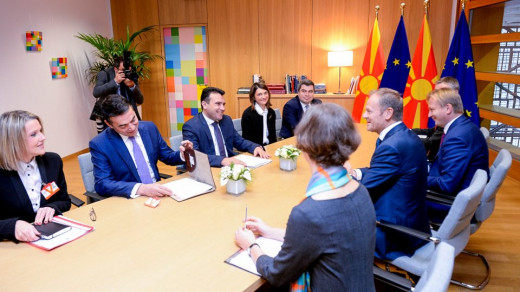Prime Minister Zoran Zaev was in Brussels on Wednesday for meeting with European Union officials, and the EU welcomed the amnesty for the April 2017 Parliament incident. This is a notable change in the EU position, given that in the past stages of the political crisis in Macedonia, Brussels insisted that there can be no amnesty.
EU spokesperson Maja Kocijancic said that the move is important to overcome polarization in Macedonia and to help build national consensus on strategic issues. Three former VMRO-DPMNE members of Parliament who were charged in the incident voted in favor of opening the process to amend the Constitution and rename Macedonia, and are widely seen as bargaining with their votes in the final stage of the constitutional change and demand full amnesty.
While this was going on in the European Commission, Zaev met with EU Council President Doanld Tusk and EU foreign policy chief Federica Mogherini, who both welcomed the push to rename Macedonia. In turn, Zaev offered to contribute with the Macedonian experience in solving bilateral disputes in other areas, such as the currently pressing issue of Kosovo.
– We are convinced that we can help in the whole process with the experience we gained in the Prespa process. That can be an experience for this other burning issue in the Balkans. The Balkans definitely have a joint future and we have to work together on that future and help each other and have mutual understanding. I believe that we can help the process to find a solution, said Zaev, speaking about Kosovo.
Zaev said that Tusk was a strong supporter of the current processes in Macedonia, which Zaev describe as “European manners and courageous implementation of European policies”. Zaev asked for guarantees from his hosts that after the renaming process is finished, Macedonia will be allowed to begin EU accession talks in June.





Comments are closed for this post.